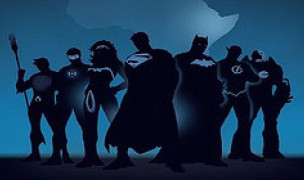 20 Terms
20 TermsHome > Terms > English (EN) > awards
awards
Academy Awards set the tone, in terms of recognition, ceremony and glamour, for many media awards that now annually recognize both excellence and box-office receipts. These awards, especially as telecast internationally, reaffirm celebrity, glamour and values of American production despite questions about the nature of the selection process. They also eclipse many smaller local and festival awards around the country. These major awards and their spectacles reinforce economic success for studios, works and artists who position themselves through advertisements, gifts and screenings to “bring their works” to the attention of voters.
The Oscars, 13½ inch statuettes awarded by the Academy of Motion Picture Arts and Sciences, first appeared in 1927 when Wings captured Best Picture while German-born Emil Jannings won Best Actor. Oscar nominations are decided upon within specialist branches before the final vote of all academy members. As the ceremony has moved from a hotel auditorium to wider audiences, professional roles have been taken by comedian hosts (Bob Hope, Johnny Carson, Billy Crystal, Whoopi Goldberg), and sets and production numbers have become increasingly elaborate—as have jewelry hair and costumes for stars. While moments of political intrusion are often remembered (Marlon Brando’s Native American substitute, George C. Scott’s refusal, Richard Gere’s pleas for Tibet), the Oscars tend to reaffirm the priority of Hollywood as the entertainment capital.
Indeed, workers in technical fields and “lesser-interest” awards are relegated to earlier, less publicized ceremonies so that the narrative of the Oscars focuses on the final naming of the highest categories—Best Picture and Best Director. Foreign films were added as a category in 1947. In the 1990s, limited-voting awards like the New York Film Critics and Golden Globes gained increasing attention as forerunners for the Oscars.
The National Academy of Television Arts and Sciences held its first small ceremony for the Emmy in Hollywood on January 25, 1949. Its six categories remained broad, for example, Most Outstanding Television Personality (ventriloquist Shirley Dinsdale) and Most Popular Television Program (Pantomime Quiz; KTLA), reflecting the limited scale of a nascent industry that served only 1 million sets. In the second year, categories like Children’s Television, Public Service and even advertising were added; divisions of genre and gender became established in the 1950s. Regional awards also emerged in major markets somewhat later in the 1950s as performance and programming awards topped fifty by 1970. Like the Oscars, the awards became television events in themselves, including a separate daytime Emmy presentation. Emmys also have been torn between the recognition of changing definitions of quality or breakthrough achievements and popularity—how does one compare the investigative news of 60 Minutes with baseball coverage, daytime soaps or musical variety? Nonetheless, this confluence promotes a sense of celebrity which increasingly crosses genres.
Other national media-award shows have emerged complementing these, like the televised spectacle of the Grammies (music) and Country Music Awards. Broadway’s Tony Awards (founded 1947) also have emerged to national television audiences and repackaging in Broadway advertisements that highlight the number of nominations (as well as debates over the constitution of each category).
Some awards also combine movies, television and other fields, for example music, while stressing popularity and pseudo-democracy (People’s Choice), while others draw the attention of specific audiences—MTV awards have added youngeroriented categories like Best Kiss. Meanwhile, Essence magazine sponsors awards for African achievement and ESPN hands out the ESPYS. More serious retrospective awards, including Kennedy Center Honors and American Film Institute retrospectives, have also been packaged for wider audiences. Cable television, moreover, created new premiums such as the Cable Ace awards, which recognize the burgeoning power and diversity of these channels, even as they muscle into Emmys and Golden Globes.
Overall, awards as recognition may have vital meanings in terms of careers, box-office revenues, thematic trends and even corporate survivals. At the same time, as live televisual events, they bring the excitement of uncertain outcomes (as in sports events and game shows), individual triumphs and glamorous success to audiences in the US and worldwide.
- Part of Speech: noun
- Synonym(s):
- Blossary:
- Industry/Domain: Culture
- Category: American culture
- Company: Routledge
- Product:
- Acronym-Abbreviation:
Other Languages:
Member comments
Terms in the News
Billy Morgan
Sports; Snowboarding
The British snowboarder Billy Morgan has landed the sport’s first ever 1800 quadruple cork. The rider, who represented Great Britain in the 2014 Winter Olympics in Sochi, was in Livigno, Italy, when he achieved the man-oeuvre. It involves flipping four times, while body also spins with five complete rotations on a sideways or downward-facing axis. The trick ...
Marzieh Afkham
Broadcasting & receiving; News
Marzieh Afkham, who is the country’s first foreign ministry spokeswoman, will head a mission in east Asia, the state news agency reported. It is not clear to which country she will be posted as her appointment has yet to be announced officially. Afkham will only be the second female ambassador Iran has had. Under the last shah’s rule, Mehrangiz Dolatshahi, a ...
Weekly Packet
Language; Online services; Slang; Internet
Weekly Packet or "Paquete Semanal" as it is known in Cuba is a term used by Cubans to describe the information that is gathered from the internet outside of Cuba and saved onto hard drives to be transported into Cuba itself. Weekly Packets are then sold to Cuban's without internet access, allowing them to obtain information just days - and sometimes hours - after it ...
Asian Infrastructure Investment Bank (AIIB)
Banking; Investment banking
The Asian Infrastructure Investment Bank (AIIB) is an international financial institution established to address the need in Asia for infrastructure development. According to the Asian Development Bank, Asia needs $800 billion each year for roads, ports, power plants or other infrastructure projects before 2020. Originally proposed by China in 2013, a signing ...
Spartan
Online services; Internet
Spartan is the codename given to the new Microsoft Windows 10 browser that will replace Microsoft Windows Internet Explorer. The new browser will be built from the ground up and disregard any code from the IE platform. It has a new rendering engine that is built to be compatible with how the web is written today. The name Spartan is named after the ...
Featured Terms
Contributor
Featured blossaries
Browers Terms By Category
- Material physics(1710)
- Metallurgy(891)
- Corrosion engineering(646)
- Magnetics(82)
- Impact testing(1)
Materials science(3330) Terms
- Yachting(31)
- Ship parts(4)
- Boat rentals(2)
- General sailing(1)
Sailing(38) Terms
- Cheese(628)
- Butter(185)
- Ice cream(118)
- Yoghurt(45)
- Milk(26)
- Cream products(11)
Dairy products(1013) Terms
- General art history(577)
- Visual arts(575)
- Renaissance(22)
Art history(1174) Terms
- Capacitors(290)
- Resistors(152)
- Switches(102)
- LCD Panels(47)
- Power sources(7)
- Connectors(7)




